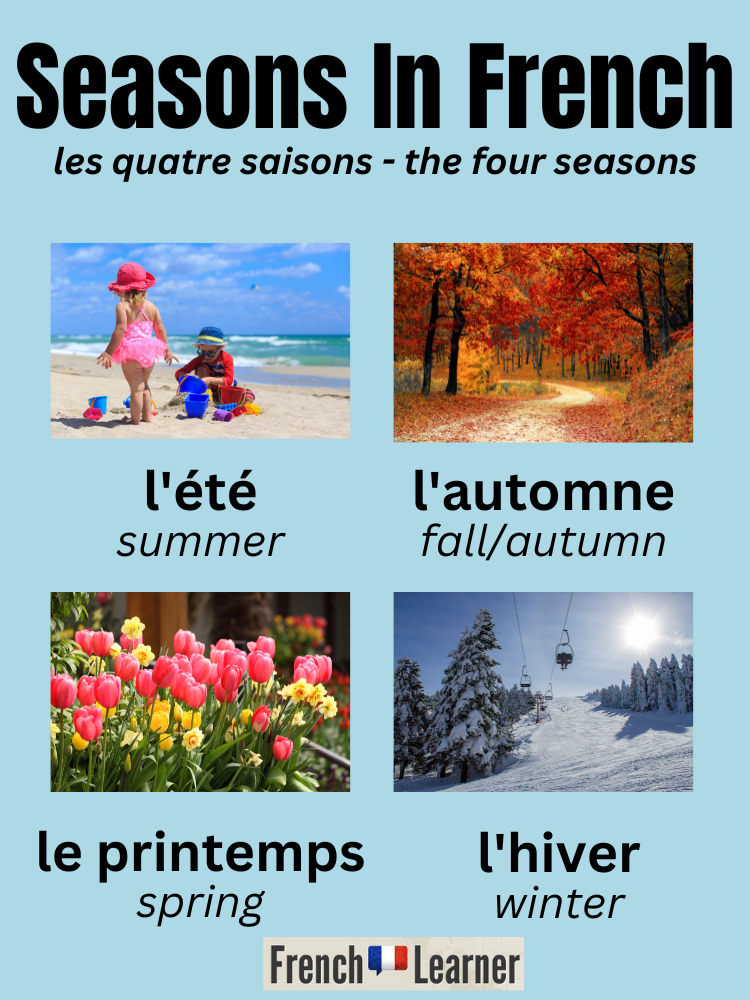The four seasons in French are: le printemps (pronounced pʀɛ̃tɑ̃, l’été (pronouced ete), l’automne (pronounced ɔtɔn) and l’hiver pronounced (ivɛʀ). This post will cover the correct ways to pronounce the seasons, which prepositions to use, as well as example sentences and expressions.

French Seasons of the Year
Four seasons in French in a nutshell:
- le printemps spring / au printemps in the spring
- l’été summer / en été in the summer
- l’automne fall, autumn / en automne in the fall, in autumn
- l’hiver winter / en hiver in the winter

Le Printemps – Spring
In French, “spring” is “le printemps”. The pronunciation of this word is a bit difficult. The “in” is a nasal “ɛ̃” and the “emps” is a nasal “ɑ̃”. Do not pronounce the -p or the -s. Our friend, Julien, on YouTube explains how to pronounce “printemps”. This lesson on our site covers printemps in detail.
Talking about spring in sentences
The word “printemps” is masculine. Thus, it’s “le printemps”. When speaking about spring in the general sense, “le” (the) must precede the noun. For example:
- J’adore le printemps! I love (the) springtime!.
To say, “in the spring”, “in springtime”, the word “printemps” takes the preposition “au”. For example:
- Que faites-vous au printemps? What are you doing in the springtime?
- Il commence a faire beau au printemps. The weather gets nice out in the spring.
To say “this” spring, “printemps” is preceded by “ce”. For example:
- On part en vacances ce printemps. We’re going on vacation this spring.
“Ce” is a demonstrative adjective, meaning “this”. This page on our site covers demonstrative adjectives in detail.
A fun French expression with the word “printemps” is: “Une hirondelle ne fait pas le printemps”, meaning “One swallow does not make a summer”.
L’été – summer
The French word for “summer” is “été”. The pronunciation is quite simple: ay-tay. “Été” s a masculine noun. Note that “été” is also the past participle of the verb “être” (to be). Hence, “été” in French also means “was” or “been”. This lesson on our site covers “été” in detail.
In the following video, Julien on YouTube teaches how to pronounce “été“.
Talking about summer in sentences
When speaking about the summer in general, “été” takes the direct article “l'”. Hence, l’été means “the summer”. For example:
- J’aime l’été parce qu’il fait beau. I like (the) summer because it’s nice out.
To express “during the summer” or “in the summer”, “été” is preceded by the preposition “en”. For example:
- En été, on va à la plage. People go to the beach during the summer.
To say “this” summer, “été” is preceded by “cet”. For example:
- Qu’est-ce que tu vas faire cet été? What are you going to do this summer?
“L’heure d’été“ refers to daylight saving time, the time of the year when the clocks are moved one hour ahead. “Passage à l’heure d’été” refers to the act of putting the clocks forward in the springtime.
L’automne – fall, autumn
The French word for “fall” or “autumn” is “l’automne”. Unlike English were the -m is pronounced, the -n is pronounced in French. Hence, if you end the word with the -m sound in French, it’s wrong. The correct pronunciation is “oh-tun”.
Julien on YouTube teaches how to pronounce “l’automne”.
Talking about the fall (autumn)
“Automne” is masculine noun and is preceded with the article “l'” to mean “the fall (autumn)”. For example:
- J’adore les couleurs de l’automne. I love the colors of (the) fall.
To say “in the fall” or “in autumn”, the French word “automne” is preceded by the preposition “en”. For example.
- Les cours commencent en automne. Classes start in the fall.
To express “this fall”, “automne” is preceded by “cet”. For example:
- Je prépare mon voyage cet automne. I’m preparing for my trip this fall.
L’hiver – winter
The French word for winter is “hiver”. The -h is a silent or aspirated and not pronounced at all. Hence, the pronunciation is “ee-ver”. You must pronounce the -r. Julien on YouTube teaches how to pronounce “hiver” in the following video.
Talking about the winter
To talk about the winter in the general sense, the word “hiver” is preceded by “l'”. For example:
- J’aime l’hiver pour faire du ski. I like the winter for skiing,
To say “in the winter” or “during the winter”, the word “hiver” is preceded by “en”. For example:
- Il fait froid en hiver. It’s cold out during the winter (in wintertime).
“L’heure d’hiver“ refers to the time of the year when the clocks are put back by one hour. “Passage à l’heure d’hiver” is the act of putting the clocks back.
Seasons in French – Conclusion
On this page you learned the seasons in French. All four seasons are masculine take the preposition en, with the exception of le printemps (spring), which takes au. The following table offers the names of the seasons as well as their respective dates.
| French season and preposition | What season is it? | Dates | |
| Spring | au printemps in the springtime | c'est le printemps it's springtime | du 21 mars au 20 juin from March 21 through June 20 |
| Summer | en été in/during the summer | c'est l'été (m) it's the summer | du 21 juin au 20 septembre from June 21 through Sept. 21 |
| Autumn | en automne in/during the fall | c'est l'automne (m) it's fall/autumn | du september 21 au 20 décembre from Septembre 21 through Dec. 20 |
| Winter | en hiver in/during the winter | c'est l'hiver (m) it's winter | du 21 décembre au 20 mars from Dec. 21 through March 20 |
Discover more:
More resources:
- How to talk about the seasons in French (Frenchtoday.com)

